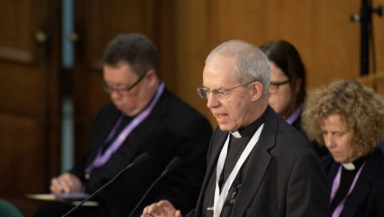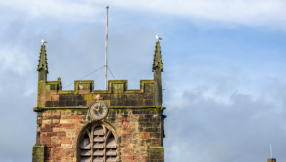
The Archbishop of Canterbury has called for an end to the bloodshed in Gaza as the death toll continues to climb.
In his presidential address to the Church of England General Synod, Archbishop Justin Welby said that "the killing of so many civilians [and] the extensive damage to civilian infrastructure cannot be morally justified".
He said that although he believed Israel had a "right and duty" to defend itself, "the suffering of innocent Palestinians cries out as a great wrong."
"As I have said before: the evils of Hamas cannot be paid by the civilians of Gaza," the Archbishop said.
He continued, "I do not believe that the devastating loss of civilian life and humanitarian catastrophe, resulting from Israel's bombardment and siege of Gaza, can be morally justified."
Later in his address, the Archbishop remarked on his recent solidarity visit to Jerusalem where he met Christian leaders who have been united in calling for an immediate humanitarian ceasefire.
"That was over three weeks ago. Thousands more innocent men, women and children in Gaza have been killed since then – while thousands in Israel still mourn those killed on the 7th October, and hundreds of families still plead for the release of their loved ones," he said.
"So I repeat that call again today with renewed urgency and even more force. This bloodshed must cease, hostages must be released, and aid must reach those in Gaza in dire need.
"I do not have military or political answers to this crisis. I do not speak from those perspectives. But the call for a ceasefire is a moral cry that we are hearing from people of many faiths and none. Our common humanity must find another way to achieve justice, security and peaceful co-existence for Israelis and Palestinians from now, for the future."
Welby's address was followed by a recorded message from the Archbishop in Jerusalem, Hosam Naoum, who said that the pursuit of peace and reconciliation in the Holy Land was a "difficult and controversial" task but was needed "now more than ever".
He asked Synod members to pray for both Palestinians and Israelis, and urged the global community to work towards a peaceful resolution to the conflict, and the protection of civilians and humanitarian corridors.
"In a time of war, especially here in the Middle East and in the Holy Land, both Palestinians and Israelis are seeking a better future. But this doesn't mean that violence can be the only way, or even the way in which we strive for peace and reconciliation," he said.
"If we are really concerned about the security for Israelis and the self determination of the Palestinian people for a free and enduring and durable state in the future, we need the efforts of everyone around the world, that we may focus on the day after the war, where peace - a just and lasting one - will be the only way forward for the end of the cycle of violence here in the Holy Land."
He added, "As we continue to strive for peace and as we continue to spread the work of reconciliation, even though it falls on deaf ears at this time of war and violence and suffering, now we need to hold to what we believe in, because that is what God has called us for."













